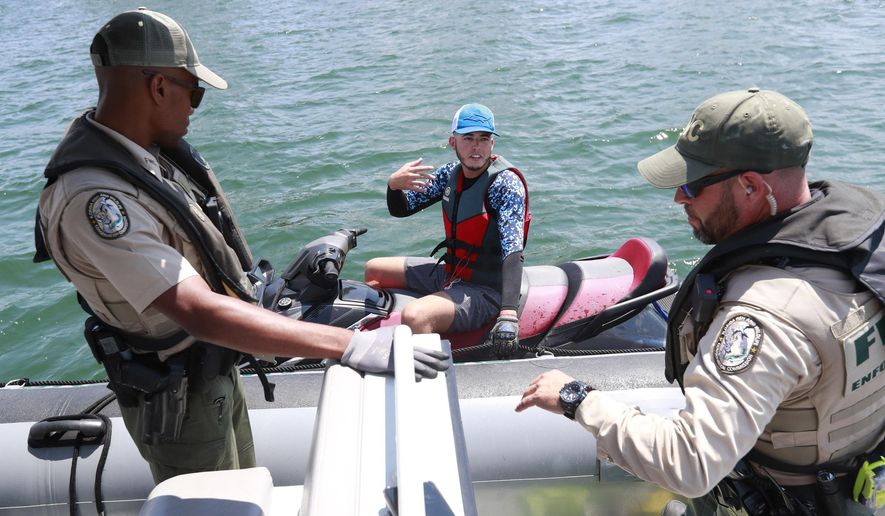Senate Republicans on Tuesday addressed growing fears that the Biden administration may curtail hunting and fishing on national wildlife refuges after opting to settle rather than fight an environmental lawsuit.
A letter signed by 26 Senate Republicans urged the U.S. Fish and Wildlife Service to stand firm against the lawsuit challenging the historic 2020 expansion of hunting and fishing on 2.3 million acres of public lands.
“We are encouraged that a sportswoman with first-hand knowledge of the intersection between federal policies and state wildlife conservation is leading USFWS in these discussions and encourage you to remain steadfast in defending sportsmen access,” reads the letter to Fish and Wildlife Service director Martha Williams.
The letter, led by Sen. Steve Daines, Montana Republican, was sent as hunters and anglers sounded the alarm about the agency’s decision in February to enter into settlement negotiations with the Center for Biological Diversity, which filed the lawsuit in November.
The center alleged violations of the Endangered Species Act and National Environmental Policy Act, arguing that expanding hunting and fishing acreage increases the risk to threatened species from accidental shootings and lead poisoning from spent ammunition.
“We’re going to court to ensure that our nation’s wildlife refuges actually provide refuge to endangered wildlife,” center staff attorney Camila Cossío said in a November statement. “The Fish and Wildlife Service is shrugging off the many risks that sport hunting and fishing pose to endangered animals, particularly from lead ammunition and tackle.”
Stopping the use of lead ammunition and tackle means that “the animals that call these beautiful places home will be healthier, and so will the people who enjoy these lands,” Ms. Cossio said in a Tuesday statement.
About 90% of ammunition is made with lead, and the alternatives are costlier. The nation is now mired in an ammo shortage driven by factors such as the spike in firearms purchases during the pandemic and supply-chain backups.
“Phasing-out lead ammo and tackle on wildlife refuges would disproportionately affect lower-income households and those that depend on hunting and fishing for their subsistence as lead alternatives are often more expensive,” the Senate letter reads. “The impact of such a policy would be devastating to the sportsmen heritage in our states.”
In March, 42 outdoor-recreation groups called on the agency to “cease settlement discussions with CBD, vigorously oppose their baseless lawsuit, and defend the lawful and appropriate expansion of hunting and fishing on over 2.3 million acres of National Wildlife Refuges.”
Four organizations — the Rocky Mountain Elk Foundation, the National Rifle Association, the Safari Club and the Sportsmen’s Alliance — filed in March a motion to intervene in the lawsuit before the U.S. District Court in Missoula, Montana.
“We stand with professional wildlife managers, biologists and sportsmen and women nationwide calling for the dismissal of this blatant effort seeking to deny public access to public lands,” said Kyle Weaver, president and CEO of the Rocky Mountain Elk Foundation.
The Trump administration announced in August 2020 the opening or expansion of hunting and fishing on 138 national wildlife refuges and nine national fish hatcheries, calling it the “single largest expansion of hunting and fishing opportunities by the U.S. Fish and Wildlife Service in history.”
Not to be outdone, the Biden administration a year later expanded hunting and fishing opportunities across 2.1 million acres, including 88 wildlife refuges and one hatchery, calling it the “largest expansion of outdoor recreation opportunities in recent history.”
The decision by the Biden administration to barter with groups seeking to rescind the Trump expansion after announcing its own expansion left some stakeholders scratching their heads.
“A few short months ago, the Biden Administration was touting the largest expansion of hunting and fishing in history on these lands and now they’re negotiating with animal-rights activists over hunting opportunities, while excluding sportsmen from having a seat at the table,” Evan Heusinkveld, president and CEO of the Sportsmen’s Alliance Foundation, said in a statement.
Hunting and fishing have long been permitted in the national wildlife refuge system, which includes 567 refuges and 38 wetland management districts. The 1997 National Wildlife Refuge System Improvement Act allows hunting, angling and trapping on any refuge where compatible.
“Hunting is a healthy, traditional recreational use of renewable natural resources deeply rooted in America’s heritage, and it can be an important wildlife management tool,” said the Fish and Wildlife Service.
Hunting, angling and other outdoor activities generated more than $156 billion in economic activity in 2016, the service said, which supports state conservation budgets.
“Policies or actions that reduce or limit sportsmen activities necessarily implicate wildlife conservation programs by affecting state agencies’ revenue,” the Senate letter reads. “Such policies or actions also handcuff wildlife managers by removing a critical conservation tool while needlessly alienating one of our original conservationists, sportsmen.”
The Interior Department declined to comment on the Senate GOP letter.
• Valerie Richardson can be reached at vrichardson@washingtontimes.com.




Please read our comment policy before commenting.